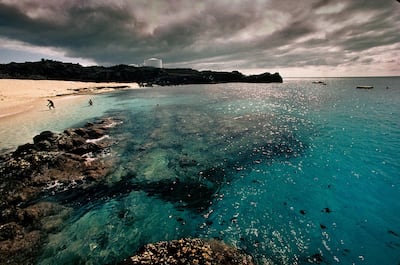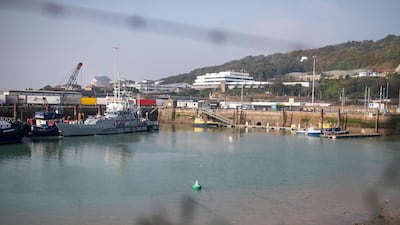The British government considered creating a processing centre for asylum seekers on an island in the South Atlantic Ocean, 6,400 kilometres from the UK.
Home Secretary Priti Patel asked officials in her department to look into the possibility of a processing facility on the British overseas territory of Ascension Island and St Helena, as well as Morocco, among plans to shake up the country’s system for granting refugee status.
The possibility of transferring asylum seekers to the remote and sparsely populated islands in the South Atlantic was eventually shelved, the Financial Times reported.
But the initiative was taken seriously enough for the British Foreign Office to be consulted on the practicality of the plans.
The volcanic island of Ascension, which has a population of fewer than 1,000, has UK military bases that supply and defend the Falklands Islands, plus an EU space agency observation post.
Alan Nichols, a member of the Ascension Island Council in Georgetown, the capital, told the BBC he had not been consulted about the plans and questioned the viability of the centre.
“I would have thought that it would be extremely expensive. And a bit of a logistical nightmare to get asylum seekers here to Ascension because of the fact we are very isolated. And I don’t think the whole thing would be very feasible, to be quite truthful,” he said.
Mr Nichols said it was unlikely that inhabitants of the small island would welcome the migrants’ arrival.
“That could be quite an influx of individuals – and at this state and time, with pandemic lockdowns and everything else. I don’t think that anybody would be very receptive to that,” he said.
Britain has been grappling with a growing migration crisis, with thousands of migrants arriving in small boats to the English’s south coast in the past year from northern France.
Only a fraction of Britain’s asylum seekers arrive over the English Channel. About 34,000 asylum seekers registered claims in the UK in the first half of 2020.
The number arriving on small dinghies appears to be growing – by the end of August, 5,000 had crossed from France. That figure is more than double the 1,890 who made the voyage in the whole of last year.
Migration is a touchpaper topic in the UK, attracting the attention of arch-Brexiteer Nigel Farage.
Mr Farage, who played a pivotal role in the 2016 referendum campaign for the UK to leave the EU, has taken to filming migrant crossings at sea and blaming Paris for sending asylum seekers to Britain.
The migrant crisis in Europe in 2015 played a significant part in the Brexit debate, as did a spike in illegal crossings from France to England, with migrants smuggled into the UK principally inside lorries.

The decision to explore the south Atlantic as an option was arrived at as part of work considering ways other countries have dealt with migration.
The Home Office also considered creating a centre for processing asylum claims in north Africa. The plan was reminiscent of those put forward by the EU for a such a facility in Morocco when the UK was still a member of the bloc.
But Rabat in 2018 ruled out the possibility of such an initiative.
The proposals for Ascension and St Helena have been interpreted as further influence by former Australian prime minister Tony Abbot, known for his hardline position on migration, and now a trade adviser to the UK.
Human rights groups and international bodies have regularly decried conditions at Australia’s offshore detention centres.
Britain’s centre-left opposition party has blasted the plans.
“This ludicrous idea is inhumane, completely impractical and wildly expensive. So it seems entirely plausible this Tory government came up with it,” Nick Thomas-Symonds, the shadow home secretary, said.
Rossella Pagliuchi-Lor, the UN High Commissioner for Refugees' representative in the UK, said the scheme in Australia had brought about "incredible suffering" for people who had merely sought asylum.
“It seems to be both extremely inappropriate in terms of the commitments that the country should have to human rights and to asylum but also an incredible and expensive way of doing so," she told MPs in London.
“The UK has a proud reputation in providing asylum and refuge to people across the centuries. This would be a really significant departure from that approach.”
Britain’s Home Office, or interior ministry, has responded saying it was developing plans to reform its approach to migration.
“The UK has a long and proud history of offering refuge to those who need protection. Tens of thousands of people have rebuilt their lives in the UK and we will continue to provide safe and legal routes in the future,” an official said.
“As ministers have said we are developing plans to reform policies and laws around illegal migration and asylum to ensure we are able to provide protection to those who need it, while preventing abuse of the system and the criminality associated with it.”










